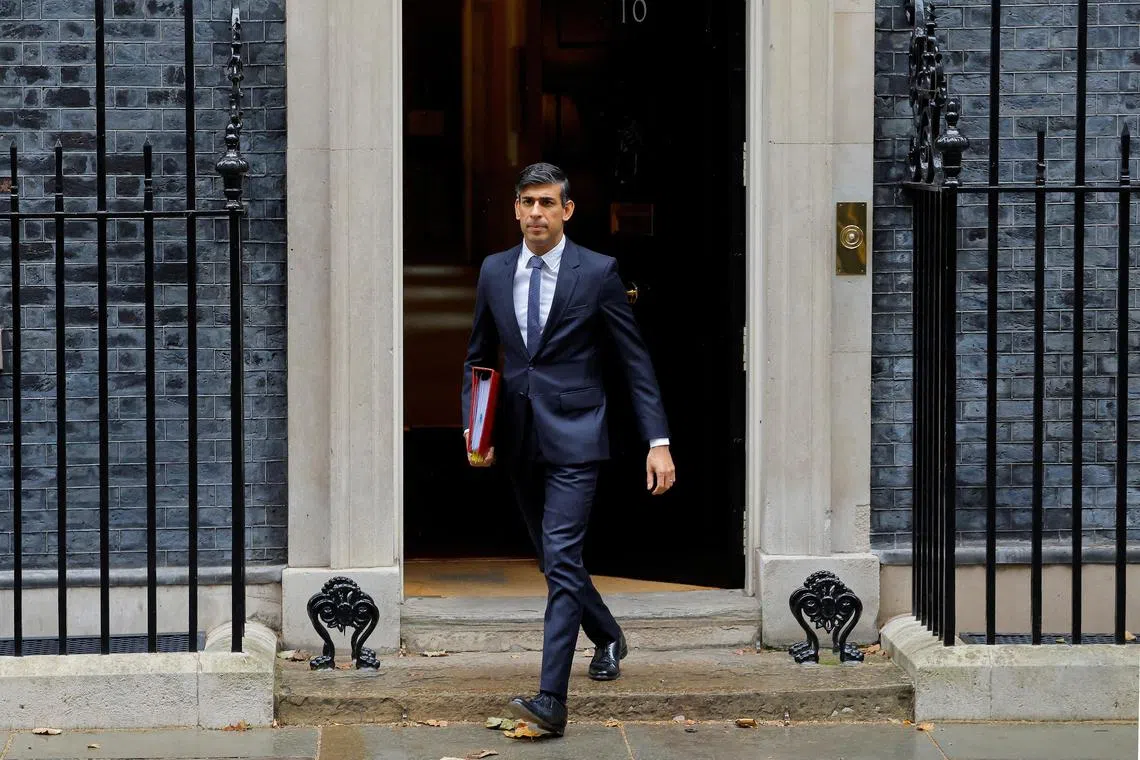British PM Rishi Sunak’s Conservatives suffer historic by-election defeats
Sign up now: Get ST's newsletters delivered to your inbox

British Prime Minister Rishi Sunak is running out of time and opportunities to close the gap with Labour.
PHOTO: REUTERS
LONDON - British Prime Minister Rishi Sunak’s governing Conservatives suffered two crushing defeats in previously safe parliamentary seats on Friday, raising doubts about his party’s ability to win the general election expected in 2024.
The double defeat showed a dramatic slump in support for the Conservatives, who have won the last four national elections, and indicates the opposition Labour Party is on course to win back power for the first time since 2010.
Labour’s Alistair Strathern won the seat of Mid-Bedfordshire, an area about 80km north of London, overturning a majority of almost 25,000, making it the biggest deficit the party has overcome in a by-election since 1945.
Labour also overturned a huge majority in another former Conservative stronghold, Tamworth, a largely rural constituency in central England, with the party enjoying the second-highest swing from the Conservatives since World War II.
“These are phenomenal results that show Labour is back in the service of working people and redrawing the political map,” Labour leader Keir Starmer said in a statement.
Mr Sunak, a 43-year-old former investment banker, has recently tried to cast himself as a bold reformer and no longer the cautious technocrat who restored some of Britain’s credibility after scandals and economic turmoil forced his two predecessors from office.
With voters angry over high inflation, economic stagnation and long waiting times to use the state-run health service, Mr Sunak is running out of time and opportunities to close the gap with Labour, which has enjoyed a double-digit polling lead over the Conservative Party for over a year.
A spokesman for the Conservatives said the results had been difficult but governments usually struggle to win elections mid-term.
In a speech at his party’s conference earlier in October, Mr Sunak said he was willing to take tough decisions to revive the economy.
He announced plans to scrap a high-speed railway line that his predecessors had championed, and in September announced plans to water down Britain’s plans to tackle climate change.
After the conference, polls showed that Mr Sunak had failed to significantly narrow the deficit with Labour, although his personal ratings improved marginally.
He is currently in the Middle East
‘Political earthquake’
Labour had played down its chances of winning either seat, with Mr Starmer’s spokesman saying this week his party had the same likelihood of a “moonshot”.
The contests in Mid-Bedfordshire and Tamworth were caused by the high-profile resignations of politicians close to former prime minister Boris Johnson.
Former minister Nadine Dorries quit her Mid-Bedfordshire seat after she failed to secure support for being appointed to the upper chamber of Parliament.
The contest in Tamworth was triggered when another politician, Mr Chris Pincher, resigned after he was suspended from Parliament for groping men at a London club. The accusations against him contributed to the collapse of Mr Johnson’s government.
Labour won the Mid-Bedfordshire seat with a majority of over 1,100, overturning a Conservative majority of 24,664 at the last general election in 2019.
The area had previously elected a Conservative member of Parliament in every election since 1931.
In Tamworth, Labour candidate Sarah Edwards won the seat with a majority of over 1,300, overturning the Conservative majority of 19,634 at the 2019 General Election.
Mr Peter Kyle, a senior Labour member, said his party had delivered a “political earthquake”.
The Conservative Party has won only one of the last 12 by-elections in this Parliament, with half of the contests caused by resignations of politicians for misconduct. REUTERS


